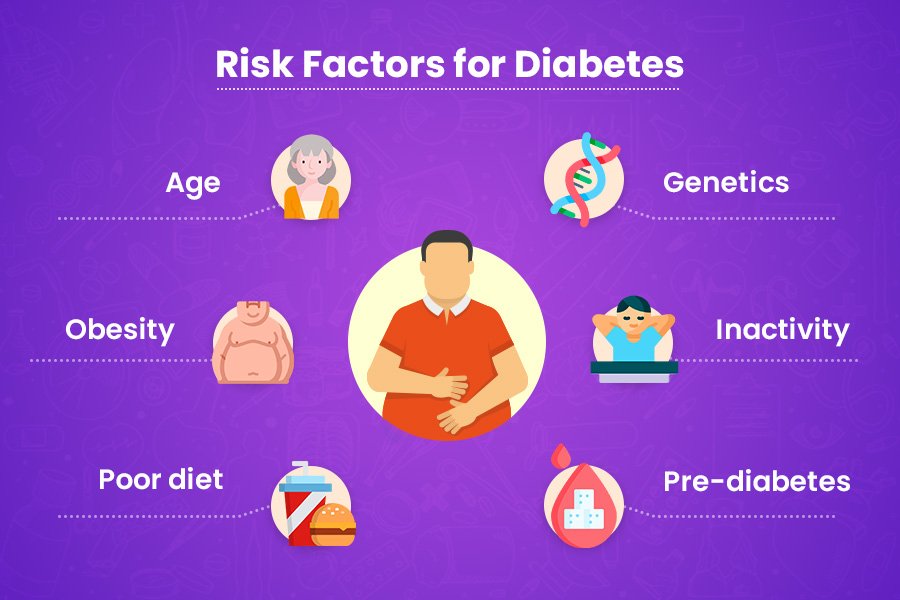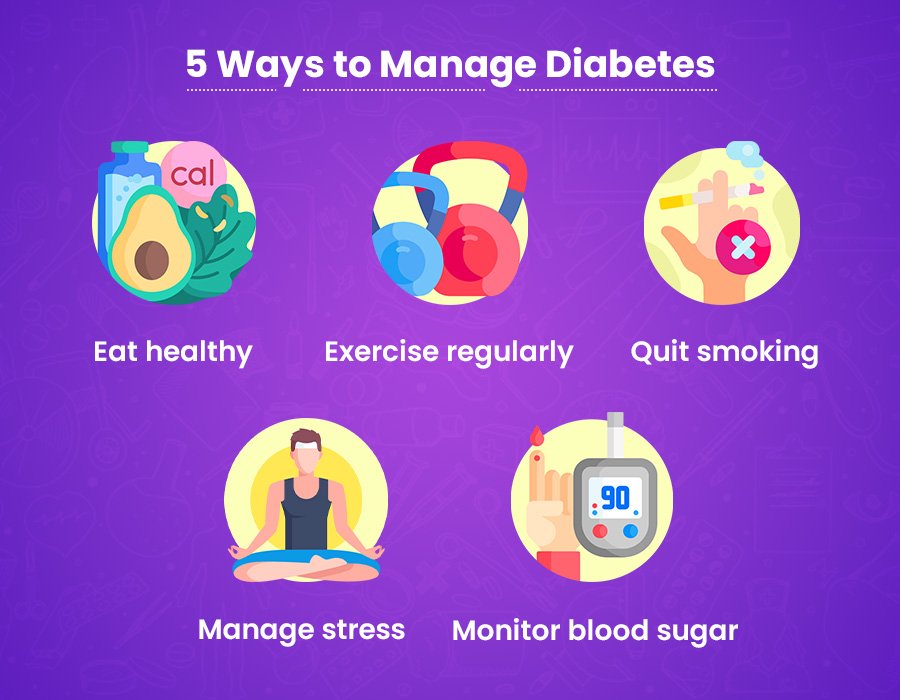Diabetes is a global public health concern that affects millions of people worldwide. According to recent statistics, around 37.3 million Americans suffer from diabetes1. Moreover, about 1 in 5 people with this condition are unaware that they are suffering from it. Diabetes can significantly impact an individual’s overall quality of life, affecting their physical, mental, and emotional well-being.
However, while there is no cure for diabetes, there are effective management strategies that can help alleviate symptoms. In this blog post, we will explore different types of diabetes, their risk factors and ways to manage the condition better.
Different Types of Diabetes
Type 1 Diabetes
Type 1 diabetes is a chronic condition in which the immune system attacks and destroys insulin-producing cells in the pancreas. Therefore, individuals suffering from this condition require insulin injections every day to manage their glucose levels. Insulin is a hormone that is essential for the regulation of blood sugar. Without adequate insulin, blood sugar can rise to dangerous levels, leading to severe health complications. Although it can develop at any age, type 1 diabetes is typically diagnosed in children and young adults. It is less common than type 2 diabetes and only affects about 5-10% of people2.
Type 2 Diabetes
Type 2 diabetes is a condition where the body becomes resistant to insulin, and the pancreas can’t produce enough of it to keep up with the body’s needs. It is often associated with lifestyle factors such as poor diet, eating processed food, lack of exercise, and being overweight or obese. It is usually diagnosed in adults over the age of 45, but it can develop at any age. Unlike type 1 diabetes, type 2 diabetes can often be managed with lifestyle changes and medication.
Pre-Diabetes
Pre-diabetes is a condition where blood sugar levels are higher than normal but not high enough to be diagnosed as diabetes. About 1 in 3 Americans are considered to be prediabetic and about 80% of those who suffer from this condition are usually unaware of it. Prediabetes is generally a warning sign that the body is struggling to produce enough insulin to regulate blood sugar levels. If left unmanaged, it can lead to type 2 diabetes and various other health complications, including heart disease and stroke.
If you or an elderly loved one needs primary care services like blood tests or treatment plans to help manage diabetes better, visit your nearest medical clinic and consult with our board-certified physicians.
What Are the Risk Factors for Diabetes?
Several risk factors can increase the likelihood of developing diabetes, such as:

Age
As people age, their body’s ability to produce and use insulin decreases significantly. This is compounded by changes in the body composition that occur with aging, such as a decrease in lean muscle mass and an increase in body fat. These changes can lead to insulin resistance, making it more difficult for the body to regulate blood sugar levels.
Genetics
Genetic predisposition can significantly increase the risk of developing diabetes. For example, people with the TCF7L2 gene are more likely to suffer from type 2 diabetes, as it affects insulin secretion and glucose metabolism. On the other hand, those with an increased expression of the HLA-DQA1 gene, responsible for differentiating between self-made proteins and those made by bacteria or viruses, are more likely to be diagnosed with type 1 diabetes.
Obesity
Obesity is a serious risk factor for type 2 diabetes. This is because when a person is obese, their body fat accumulates in areas such as the liver, pancreas, and muscle. To compensate, the pancreas produces more insulin, which can lead to overproduction and cause damage to the insulin-producing cells. Eventually, the pancreas may not be able to produce enough insulin to meet the body’s needs, leading to sustained high blood sugar levels.
Physical inactivity
When a person does not engage in regular physical activity, their muscles are not able to use glucose for energy. As a result, their body requires more insulin to keep blood sugar levels within a healthy range. Over time, this can lead to insulin resistance and increase the risk of developing type 2 diabetes.
Poor diet
A diet high in processed foods, added sugars, and saturated fats can contribute to weight gain, which is a known risk factor for diabetes. These foods can also cause spikes in blood sugar levels, leading to insulin resistance. In contrast, consuming a diet rich in fiber-containing foods, such as fruits and vegetables, can help regulate blood sugar levels and improve insulin sensitivity.
Pre-diabetes
High blood sugar levels associated with prediabetes can cause damage to the blood vessels and organs, including the pancreas, which produces insulin. Over time, this damage can lead to decreased insulin production and insulin resistance, increasing the risk of developing type 2 diabetes.
Additionally, women who develop gestational diabetes during pregnancy may also have a higher predisposition of developing type 2 diabetes later in life.
People with diabetes are at increased risk of developing several health complications, including cardiovascular diseases, kidney disease and neuropathy. However, it is possible to lower the risk of developing these problems by following measures. Read on to learn more.
Preventing Health Complications Associated with Diabetes
Prevention is better than cure hence taking these steps can help reduce one’s risk of developing diabetes-related health problems:

Eating a healthy diet
A balanced diet with whole foods, limited added sugars, and healthy fats can help control blood sugar levels and maintain overall health.
Exercising regularly
Regular exercise can reduce the risk of health complications associated with diabetes by improving blood sugar levels, reducing insulin resistance, and lowering blood pressure and cholesterol levels. Exercise can also promote weight loss and improve cardiovascular health, reducing the risk of heart disease and stroke.
Quit smoking
Smoking increases the risk of cardiovascular diseases and hypertension in people with diabetes. However, quitting smoking can improve blood flow, reduce inflammation and improve overall health and quality of life.
Manage stress
Managing stress can help lower diabetes by reducing cortisol levels and improving insulin sensitivity. Chronic stress is typically associated with hyperglycemia, so incorporating stress management techniques such as meditation, yoga, and deep breathing can be beneficial for managing both stress and diabetes.
Monitor blood sugar levels
Regularly monitoring blood sugar levels can help people make informed decisions about their diet, exercise, and medication. It can also help prevent sudden spikes or drops in blood sugar levels, which can cause immediate health issues and potentially long-term damage to the body.
Apart from lifestyle changes, insulin therapy and oral medications are also helpful in managing diabetes better. People with diabetes must take their medications as prescribed and work closely with their healthcare providers to monitor their blood sugar levels and make changes to their treatment plans accordingly.
Conclusion
Diabetes is the leading cause of lower limb amputations and blindness in the United States. It is also the reason why more and more people are now enrolling into end-stage kidney disease programs. Not only does diabetes cause serious health challenges for individuals, but it also adds a significant burden on the healthcare system as a whole. Therefore, it is essential to raise awareness about diabetes and educate people on the importance of exploring various diabetes prevention and diabetes management strategies. With proper care and attention lifestyle changes and treatment options individuals affected by diabetes can continue to lead healthy and fulfilling lives.

